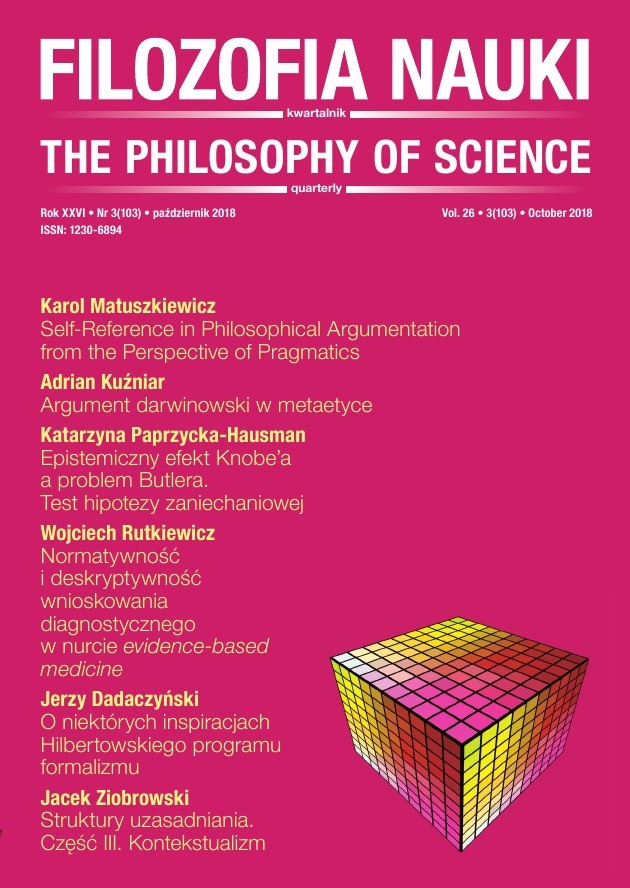O niektórych inspiracjach Hilbertowskiego programu formalizmu
DOI:
https://doi.org/10.14394/filnau.2018.0019Słowa kluczowe:
David Hilbert, Georg Cantor, Bertrand Russell, L. E. J. Brouwer, philosophy of mathematics, formalism, Hilbert’s programAbstrakt
Hilbert’s program of formalism was undoubtedly a result of many mathematical, logical, and philosophical factors. The aim of this paper is to indicate some rarely highlighted contexts. One important goal of Hilbert’s program was to prove the consistency of arithmetic. The paper shows that Hilbert did not begin the study of this issue only after the discovery of Russell’s paradox. The issue of the consistency of the arithmetic of real numbers was associated with the discovery — by Burali-Forti and Cantor — of the first set-theoretical antinomy, i.e. the antinomy of the greatest ordinal number. Hilbert, already in 1899, asked whether the set of real numbers — to use Cantor’s terminology — was a consistent collection. He then raised the issue of the consistency of the arithmetic of natural numbers in 1904, after the discovery of Russell’s paradox. Fundamental for Hilbert’s mature program of formalism was the distinction between the finitistic and the infinitistic
mathematics. The paper points out that the source of this distinction can be found in Brouwer’s proof-theoretical and constructivist criticism of certain theorems of the classical logic. So significant was the criticism that Hilbert had to take it into account in his formalistic reconstruction of classical mathematics. The result was precisely his distinction between the finitistic and the infinitistic mathematics.
Bibliografia
Brouwer L. E. J. (1923), Über die Bedeutung des Satzes vom ausgeschlossenen Dritten in der Mathematik, insbesondere in der Funktiontheorie, "Journal für die reine und angewandte Mathematik" 154, 1-7.
Burali-Forti C. (1897), Una questione sui numeri transfiniti, "Circolo Matematico di Palermo" 11(1), 154-164. https://doi.org/10.1007/BF03015911
Cantor G. (1932), Gesammelte Abhandlungen, E. Zermelo (Hrsg.), 443-450. https://doi.org/10.1007/978-3-662-00274-2
Grattan-Guiness I. (1971), The Correspondence between Georg Cantor and Philip Jourdain, "Jahresbericht der Deutschen Mathematiker-Vereinigung" 73, 111-130.
Hilbert D. (1900a), Mathematische Probleme, "Nachrichten von der Gesellschaft der Wissenschaften zu Göttingen. Mathematisch-Physikalische Klasse" 3, 253-297.
Hilbert D. (1900b), Über den Zahlbegriff, "Jahresbericht der Deutschen Mathematiker-Vereinigung" 8, 180-184.
Hilbert D. (1905), Über die Grundlagen der Logik und der Arithmetik [w:] Verhandlungen des Dritten Internationalen Mathematiker-Kongresses in Heidelberg vom 8. bis 13.
Hilbert D. (1923), Die logischen Grundlagen der Mathematik, "Mathematische Annalen", 88, 151-165. https://doi.org/10.1007/BF01448445
Jourdain P. (1904), On the Transfinite Cardinal Numbers of Well-Ordered Aggregates, "The London, Edinburgh, and Dublin Philosophical Magazine and Journal of Science" 7(39), 61-75.
Murawski R. (1986), Filozofia matematyki. Antologia tekstów klasycznych, wyb. i oprac. R. Murawski, Poznań: Wydawnictwo Naukowe UAM.



















 Filozofia Nauki | ISSN 1230-6894 | e-ISSN 2657-5868
Filozofia Nauki | ISSN 1230-6894 | e-ISSN 2657-5868